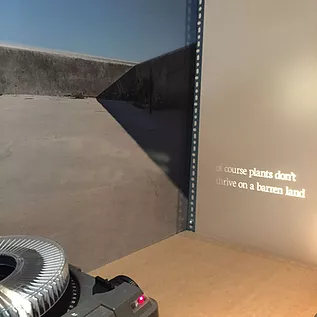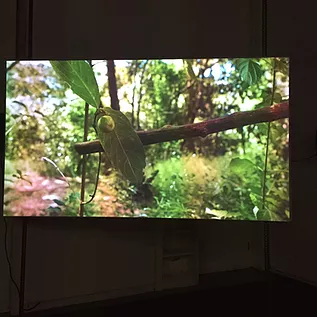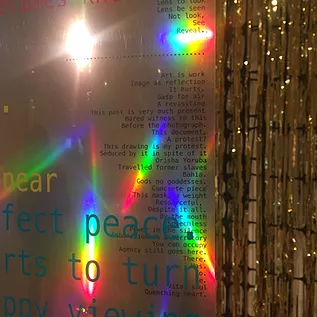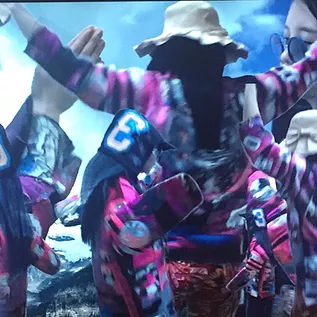Uriel Orlow @ Showroom & Kind of Flossy @ Assembly Point
Zarina Muhammad
Emoji summary: 🌿 👀 🏞
I think I often try to write about clusters of shows at once, all at the same time. And i’m not too sure why. I guess I’m happy to not isolate the way I think about these things (how can I write like that…?); I want to situate them within my day in a real and kinda solid way. So on Wednesday night I went to that talk at the ICA about blackness and the internet. Thursday me and my mum had a fun art-day bc we both had a day free. We went to the Showroom to see Uriel Orlow’s plant stories, and Assembly Point to see Kind of Flossy, a group show curated by C.R.E.A.M. I guess I wanna talk you through this because I haven’t yet really made my thoughts about all these things cogent yet, and I might do that through writing. But if this is mad and messy and I amble and don’t come to a conclusion, at least you know why.
At the talk on Wednesday, Derica Shields spoke about Black Flora, the initial uncomfortability and radical reclamation of being black in nature. And it felt like one of those moments when you just kinda connect some dots that have been floating around in your head for time. You know when someone says something and clouds just part in ur mind and ur like “I SEE THAT YEP” Like the idea of being outside, perhaps more specifically in a black American sense, you are constantly in conversation with the figure of the plantation and the runaway. Landscapes, specifically the British landscape, were built, existed, supported by black bodies on plantations and the shift that was made from human body into material body, able to be monetised to support farm subsidies back in Mother Britannia. (This is me badly paraphrasing Derica, who went into much better, clearer analysis.)
We went to The Showroom first. My mum made me take a press release bc she fancied reading it. She read out the first bit that said the show ‘looks at the botanical world as a stage for politics at large’ and she giggled at the bit that spoke about plants as witnesses/actors/agents. I guess i’m glad bc I wouldn’t have known this if she didn’t force me to think about it. I was most taken in by the films. They slipped in and out of addressing .you. and showing .you. and it felt really nice. Like a mixture of touches all specially tailored. At times it was a trial re-enactment: like a nativity play with wild costumes and deliberate delivery / side-eyes, breaking the fourth wall —- I remember GCSE English my teacher explaining and dissecting Macbeth’s soliloquies —- I used to stare out the window and think ‘who the fuck cares’ but this to-the-side-between-u-and-me had purpose and intent - - - it was a different stroke, a different touch-reveal / meta too in a certain way::: you see the farce of re-enactment. it isn’t slick. there are the same four actors in the trial arguing amongst themselves and you see them change costume at the stand /// all these things reveal enough without telling you what it’s about. You sit on this wobbly ledge and find a way to balance; there’s a satisfaction in it. The film shifts and switches. From the trial of a South African herbalist/medicine man in the 1940s, accused by the white medical establishment /// it flips across to a softer touch. Healers and herbalists around South Africa perform their practice without explaining. There are close ups on their hands and the things they hold, but no subtitles. My mum said that we don’t know why these remedies work, but they just do. Like when I’m ill she gives me tumeric in milk. We’ve never bothered to figure out why / I think that mysticism is scary for Western science that wants and needs (requires) justification or explanation. Reason (in that sense) doesn’t belong in indigenous medicine. That type of knowledge can threaten when it isn’t quantifiable or tangible. But It never dies. You can’t kill it really.
At the ICA talk, Taylor Le Melle spoke about hyper visibility online: they said, muslims, ppl of colour, specifically black ppl, are most experienced when talking about being watched asymmetrically. We are privy already, pre-internet surveillance/post 9/11, to the conversation around being watched and negating or opting out of that asymmetric surveillance. How do u successfully refuse unilateral viewing? Ask them.
My mum was disgruntled that I was taking her south of the river. She doesn’t like walking in the rain. But she thought the journey to Assembly Point was worth it. The works were like the last show in their delivery and that’s why I want to write about them together. Because softness and instability is such a nice thing for me watching it. I love looking at stuff and seeing it gently gently test the limits of where it’s plonked itself - - - - -> I like seeing care and caress. It felt the same; all different strokes, different touch-reveals but with a similar voice speaking. I don’t think I normally like group shows bc I just prefer a more cohesive or unified voice. I like feeling immersed in a thing that an artist has done, and I don’t get that feeling with group shows. Except I did here. It felt like different addresses but similar things/similar end points maybe. I spent the full 21 minutes watching Zadie Xa’s Moorings, Crystals and Opal Coloured Stones. It felt like watching Youtube videos. Each segment was long enough to last my attention span before it shifted its gaze and its pace. And it was the kind of work I wish I was making u kno.
And I feel like there’s a thing rising as I try and think about all these things as I’m writing them. A connection between Derica speaking about Black Flora, the uncomfortabilty of where blackness starts and landscape ends; of the mysticism of folk medicine, the herbal man, the power he has and that fear of un - quantifiable/qualifiable knowledge; of visibility and power in a surveillance state; the black flaneur and the privilege of wandering without being watched; sight and spectacle. I don’t know what I think but I know that dots are there, I don’t know if they’re missing or they’re not actually there at all. Maybe I only see all of this as connected bc I was thinking of them all at the same time? Maybe what i think i’m thinking is the hypervisibility that comes with indigenous knowledge and the danger of that visibility - - - these systems existed b4 the internet in different ways, but the internet made it rise to the surface like a zit emerging after a facemask. ????? webcam as colonial gaze reimagined ???? idk but if u do, @ us on twirra we wana know <3
Kind of Flossy is on @ Assembly Point till 10th Dec / Uriel Orlow's Plant Stories closed on Saturday :( but u can look at bits of it online here



